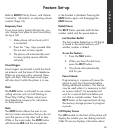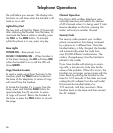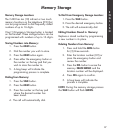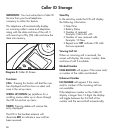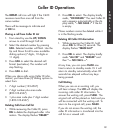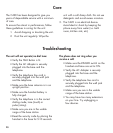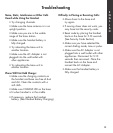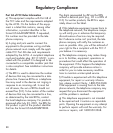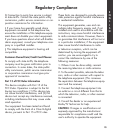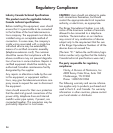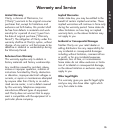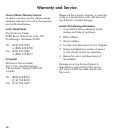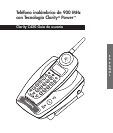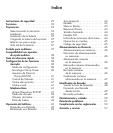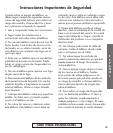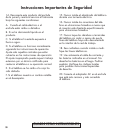
Regulatory Compliance
23
h) Connection to party line service is subject
to state tariffs. Contact the state public utility
commission, public service commission or cor
-
poration commission for information.
i) If your home has specially wired alarm
equipment connected to the telephone line,
ensure the installation of this telephone equip
-
ment does not disable your alarm equipment.
If you have questions about what will disable
alarm equipment, consult your telephone com
-
pany or a qualified installer.
j) This telephone equipment is hearing aid
compatible.
Customer-Owned Coin/Credit Card Phones:
To comply with state tariffs, the telephone
company must be given notification prior to
connection. In some states, the state public
utility commission, public service commission
or corporation commission must give prior
approval of connection.
Part 15 of FCC Rules Information
This device complies with Part 15 of the
FCC Rules. Operation is subject to the fol
-
lowing two conditions: (1) This device may
not cause harmful interference, and (2) this
device must accept any interference received,
including interference that may cause unde
-
sired operation.
Your equipment has been tested and found
to comply with the limits of a Class B digital
device, pursuant to Part 15 of FCC rules.
These limits are designed to provide reason
-
able protection against harmful interference
in residential installation.
This equipment generates, uses and can
radiate radio frequency energy and, if not
installed and used in accordance with the
instructions, may cause harmful interference
to radio communications. However, there is
no guarantee that interference will not occur
in a particular installation; if this equipment
does cause harmful interference to radio
or television reception, which can be
determined by turning the equipment off
and on, you are encouraged to try to
correct the interference by one of the
following measures:
1. Where it can be done safely, reorient
the receiving television or radio antenna.
2. To the extent possible, relocate the televi
-
sion, radio or other receiver with respect to
the telephone equipment. (This increases
the separation between the telephone equip
-
ment and the receiver.)
3. Connect the telephone equipment into
an outlet on a circuit different from that to
which the television, radio, or other receiver
is connected.
4. Consult the dealer or an experienced
Radio/TV Technician for help.
CAUTION: Changes or modifications not
expressly approved by the manufacturer
responsible for compliance could void the
user’s authority to operate the equipment.
E
N
G
L
I
S
H



